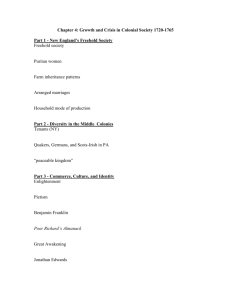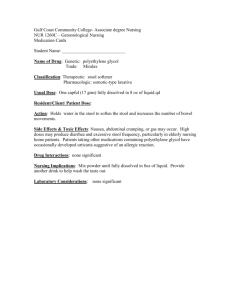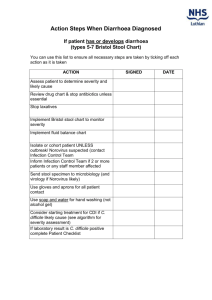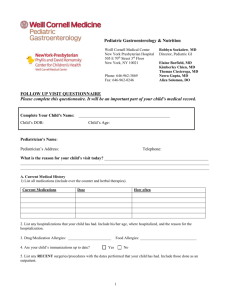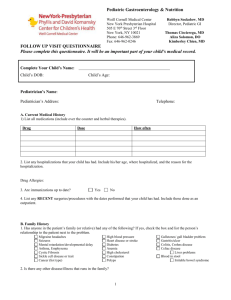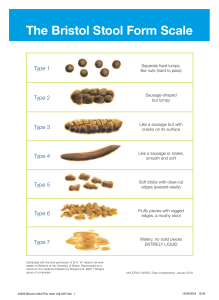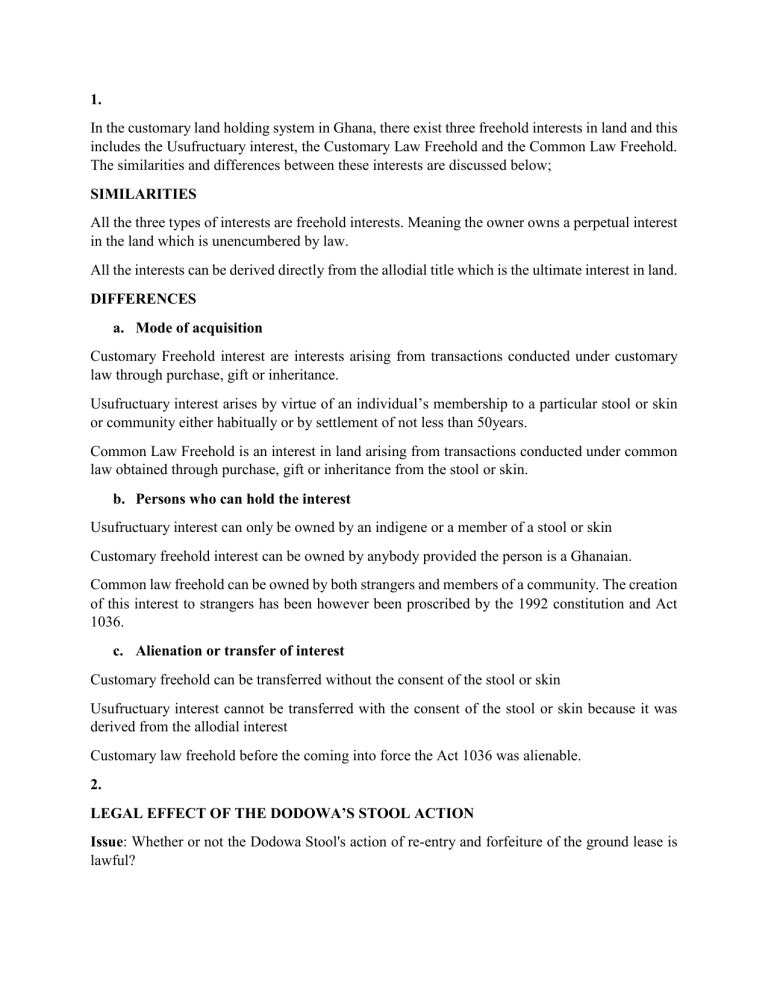
1. In the customary land holding system in Ghana, there exist three freehold interests in land and this includes the Usufructuary interest, the Customary Law Freehold and the Common Law Freehold. The similarities and differences between these interests are discussed below; SIMILARITIES All the three types of interests are freehold interests. Meaning the owner owns a perpetual interest in the land which is unencumbered by law. All the interests can be derived directly from the allodial title which is the ultimate interest in land. DIFFERENCES a. Mode of acquisition Customary Freehold interest are interests arising from transactions conducted under customary law through purchase, gift or inheritance. Usufructuary interest arises by virtue of an individual’s membership to a particular stool or skin or community either habitually or by settlement of not less than 50years. Common Law Freehold is an interest in land arising from transactions conducted under common law obtained through purchase, gift or inheritance from the stool or skin. b. Persons who can hold the interest Usufructuary interest can only be owned by an indigene or a member of a stool or skin Customary freehold interest can be owned by anybody provided the person is a Ghanaian. Common law freehold can be owned by both strangers and members of a community. The creation of this interest to strangers has been however been proscribed by the 1992 constitution and Act 1036. c. Alienation or transfer of interest Customary freehold can be transferred without the consent of the stool or skin Usufructuary interest cannot be transferred with the consent of the stool or skin because it was derived from the allodial interest Customary law freehold before the coming into force the Act 1036 was alienable. 2. LEGAL EFFECT OF THE DODOWA’S STOOL ACTION Issue: Whether or not the Dodowa Stool's action of re-entry and forfeiture of the ground lease is lawful? Rule: Under Ghanaian law, a lessor has the right to re-enter leased premises if the lessee breaches any condition or covenant contained in the lease agreement, as stipulated in section 57 of the lands Act, 2020. However, proper notice must be given to the lessee specifying the breach and providing a reasonable time to remedy the breach. Application: Kojo Donkor, as the lessee, failed to fulfill the conditions of the ground lease by not commencing and completing development within the specified time frame. Additionally, he breached the covenant by assigning his interest in the property without the Dodowa Stool's consent. The elder of the Dodowa Stool found the building at the foundation level, indicating noncompliance with the development conditions. Therefore, the Dodowa Stool's re-entry and possession of the land is legally justifiable under the terms of the ground lease and the Lands Act, 1036. Conclusion: The Dodowa Stool's action of re-entry and forfeiture of the ground lease is legally effective due to Kojo Donkor's breach of the lease covenant and conditions. MR. EKOW’S REMEDY IN LAW Issue: Whether or not Mr. Ekow Manu have any legal remedy against the Dodowa Stool at the High Court? Rule: Under the Act 1036, a purchaser of property may have legal remedies against a lessor for wrongful eviction or breach of covenant. Where the purchaser is unaware of any breaches by the original lessee, he could argue that he acted in good faith. Application: Mr. Ekow Manu purchased the land and blocks from Kojo Donkor without the consent of the Dodowa Stool, which constituted a breach of the lease agreement. This makes the re-entry and forfeiture to lawful, however, Mr. Ekow Manu may argue that he acted in good faith and was unaware of Donkor's breaches. He may seek remedies for wrongful eviction or breach of covenant against the Dodowa Stool at the High Court. Conclusion: Mr. Ekow Manu may have legal remedies against the Dodowa Stool at the High Court, such as damages for wrongful eviction or breach of covenant, depending on the specific circumstances and evidence presented during the legal proceedings.
